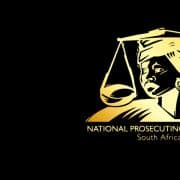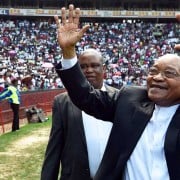|
Getting your Trinity Audio player ready...
|
Update: Zuma and his counsel have conceded that the dropping of charges against him was irrational. The court has reserved judgment and is adjourned. Two days had been set aside for this hearing.
Court is in session in Bloemfontein in the lengthy, on-going saga of the so-called spy tapes. President Jacob Zuma and the National Prosecuting Authority (NPA) today argue in the Supreme Court of Appeal (SCA) against an earlier ruling to reinstate 18 charges of fraud, racketeering and corruption against Zuma. The charges are related to 783 questionable payments, thought to be alleged inducements he received in exchange for using his political influence in the awarding of contracts around the 1999 arms deal.
Zuma is seeking leave to appeal a decision handed down in June 2016 by the Pretoria High Court, which dismissed an application for leave to appeal. Judge President Aubrey Ledwaba ruled that the appeal was not based on merit and did not have reasonable prospects of success. The application followed an April 2016 judgment handed down in the same court, which found the prosecuting authority’s decision to drop corruption charges against Zuma was irrational, and set aside the decision.
Unusually, the SCA has allowed Zuma to argue in court why he should be granted leave to appeal against the decision to reinstate his corruption charges. “The application for leave to appeal is referred for oral argument in terms of 17(2) of the Superior Courts Act 10 of 2013. The parties must be prepared, if called upon to do so, to address the court on the merits,” the court ruled, in its order dated 11 October 2016.
Justices Mahomed Solomon Navsa presides in the SCA today, with Justices Lorimer Eric Leach, Zukisa Laurah Lumka Tshiqi and Azhar Cachalia at the bench. Navsa has already challenged NPA counsel Hilton Epstein, asking for his acknowledgement that the NPA has “a very steep hill to ascend”.
The Democratic Alliance, which is the applicant in this case, has been fighting the battle since 2009. Zuma has been evading the hundreds of corruption charges for nearly 10 years. The decision to prosecute him had first been made in 2007.
After the high court’s June 2016 dismissal of the application by Zuma and the NPA, the latter indicated that it would approach the Constitutional Court separately. In October that year, however, the ConCourt refused to hear the matter at that stage.
Download the recent judgments:
Taxpayers paying for Zuma’s resistance to the truth
The DA had brought the case against three respondents, namely the former acting head of the NPA Mokotedi Mpshe; Leonard McCarthy, head of the Directorate of Special Operations (Scorpions), which was disbanded in 2009; and Zuma, who was not president at the time the charges were withdrawn.
The NPA first brought corruption charges against Zuma in 2007, but these were dismissed in September 2008 in the Pietermaritzburg High Court. The judgment was appealed and overturned in January 2009.
The NPA was about to go ahead with its case against Zuma but on 31 March 2009 Mpshe listened for the first time to the so-called spy tapes, and was so disturbed by what he said he heard – evidence of a McCarthy plot against Zuma – that he withdrew the charges against Zuma. Mpshe’s action triggered the DA’s case, launched a week later.
Mpshe’s decision to withdraw the charges, based on an alleged political plot against Zuma by McCarthy and others, was a unilateral decision that was deemed irrational by the Pretoria High Court.
In its official announcement – in appealing Ledwaba’s April 2016 judgment that the authority’s setting aside of the case in 2009 was irrational – the NPA stated that its Constitutional Court case was based on several points, one of which was its contention that the court had erred in finding that Mpshe had acted irrationally by not referring the complaint of abuse of process and the allegations of a conspiracy against Zuma to court, and making the decision unilaterally. However, the ConCourt was not convinced.
• Image from Wikipedia







